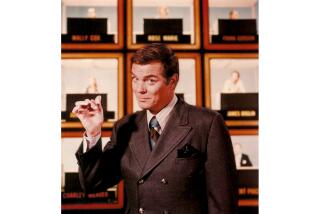Marlin Perkins of ‘Wild Kingdom’ Dies of Cancer at 81
- Share via
ST. LOUIS — Marlin Perkins, whose scholarly appearance and reedy Midwestern voice are known to millions of people around the world who watched his landmark television program, “Wild Kingdom,” died Saturday. He was 81.
Perkins, who suffered from lymph system cancer for two years, died at 4 p.m. CDT Saturday, a family spokesman said.
Perkins was an explorer, adventurer, conservationist and world-famous zoo director. Since the 1950s, he was a pioneer in filming wild animals in their natural surroundings.
Perkins dodged death in the past. He almost died on New Year’s Eve, 1928, when he was bitten by a Gaboon viper at the St. Louis Zoo. He was laid up for three weeks in Chicago in 1950 from a rattlesnake bite.
NBC began broadcasting “Wild Kingdom” in 1963, and kept it on the air for nine years. Mutual of Omaha, the insurance company that had been its sponsor from the beginning, then syndicated it through its own network.
At the height of its popularity, the show, winner of four Emmy Awards, was seen on 200 stations in North America and in more than 40 nations.
Perkins remained the show’s host until last year, when he had to curtail his activities because of his fight against lymph cancer that included chemical and radiation therapy.
Private Services Scheduled
But earlier this year, Perkins began hosting “Nature Newsbreak,” a 60-second program sponsored by Mutual of Omaha and the National Wildlife Federation.
Private memorial services were scheduled Thursday at the Church of St. Michael and St. George in Clayton, Mo. The family designated the American Cancer Society or the Wolf Sanctuary in Eureka, Mo., for memorials.
Perkins cut his teeth in the animal-show business with “Zooparade,” a program he did for 12 years for Chicago’s Lincoln Park Zoo and NBC. It was an immediate hit when it went on the air in 1945, and it put Perkins, a dropout from the zoology program at the University of Missouri, on the road to international fame.
“There’s lots of room for animal shows,” he said in a March, 1985, interview. “But we were the first one and that went on the air the minute the cable went into service between Chicago and New York.”
“Zooparade”--a name suggested by Perkins--was the successor to “A Visit to the Lincoln Park Zoo,” which debuted when there were only 300 television sets in Chicago.
“That was live television, but the concept of ‘Wild Kingdom’ developed from ‘Zooparade,’ ” said Perkins, who was among the first to bring zoo animals into a studio for programs.
Went to Africa in 1955
Perkins and his crew journeyed to Africa in 1955 for their first “Zooparade” shows done on location.
Perkins realized early on that videotape was the coming thing in television, and that it would give him the flexibility and creativity he wanted in his shows.
“We got the concept to go on location anywhere in the world with any kind of animal,” he said of the later programs for “Zooparade.”
NBC canceled “Zooparade” in 1957.
Perkins lived with his wife, Carol, on a quiet, tree-lined street in St. Louis in a comfortable, two-story brick home full of the mementos of a long career.
Perkins was born March 28, 1905, in Carthage, Mo. He said he first became interested in animals while examining the insects and other creatures unearthed by plows on the family farm.
In 1926, Perkins got a job at the St. Louis Zoo under its famed director, George Vierheller. Two years later, at age 23, Perkins became the zoo’s reptile curator.
He moved on in 1938 to become curator of the Buffalo Zoological Gardens, then became director of the Lincoln Park Zoo in 1944.
Perkins returned to the St. Louis Zoo in 1962, succeeding Vierheller. His agreement with zoo officials allowed him to divide his time between his duties in St. Louis and “Wild Kingdom.” He was zoo director emeritus after 1970.
Injured by an Elephant
Few injuries occurred in the filming of “Wild Kingdom” episodes, but Perkins was one of the victims.
In India for a show about elephants, an elephant driver, called a mahout, made a mistake.
“The mahout gave the order to lie down when I was directly in front of his elephant,” Perkins recalled. “I was in the way so the elephant reached out with his tusk and flicked me out of the way.”
Three broken ribs, a badly split lip and other injuries were the result.
“I went to town for five days and stayed in a very nice hotel,” he said.
More to Read
Sign up for Essential California
The most important California stories and recommendations in your inbox every morning.
You may occasionally receive promotional content from the Los Angeles Times.













